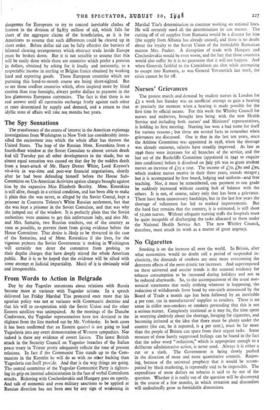Nurses' Grievances
The protest march and demand by student nurses in London for £5 a week last Sunday was an unofficial attempt to gain a hearing at precisely the moment when a hearing is made possible for the first time by official means. For this week the Whitley Council for nurses and midwives, brought into being with the new Health Service and including both nurses' and Ministers' representatives, is holding its first meeting. Nursing has won a bad name for itself for various reasons ; but there are several facts to remember when grievances are discussed. One is that in the last ten years, since the Athlone Committee was appointed in 1938, when the shortage was already ominous, salaries have steadily improved. As late as 1946 there were increases for all branches of the service, and the last act of the Rushcliffe Committee (appointed in 1941 to enquire into conditions) before it dissolved on July 5th was to grant student nurses an increase of L's a year. The income of L70, k8o and L90, which student nurses receive in their three years, sounds meagre ; but it is accompanied by free board, lodging and uniform--and free teaching. Nor, it must be remembered, can payment to one grade be suddenly increased without causing lack of balance with the others. It is not, of course, salary only that has been a grievance. There have been unnecessary hardships, but in the last few years the shortage of volunteers has led to marked improvements. But the hard fact remains that the country, it is estimated, is still short of 52,000 nurses. Without adequate nursing staffs the hospitals must be quite incapable of discharging the tasks allocated to them under the National Health Service Act. The new Whitley Council, therefore, must attack its work as a matter of great urgency.


































 Previous page
Previous page